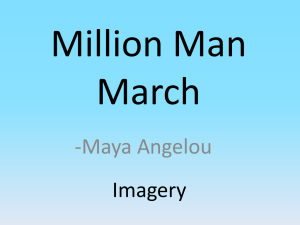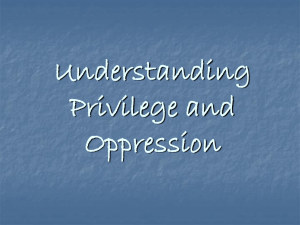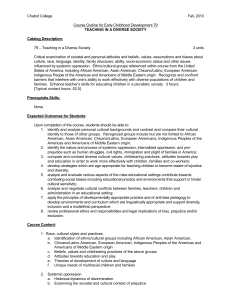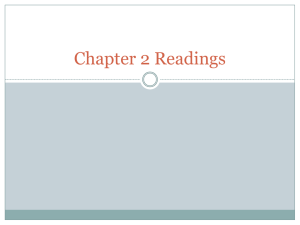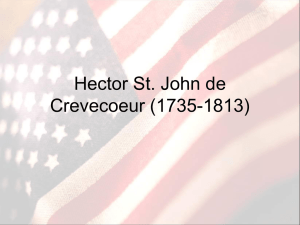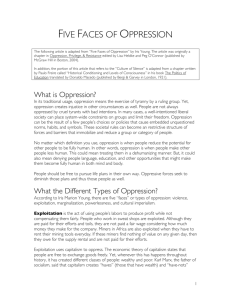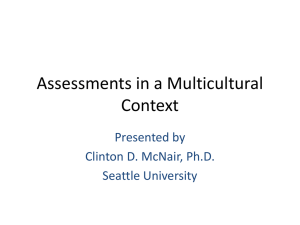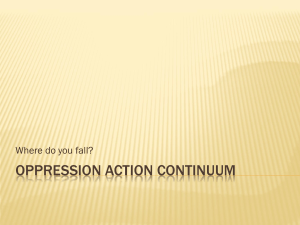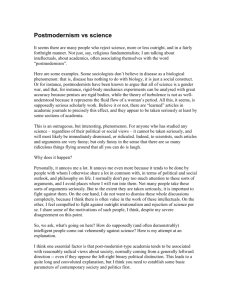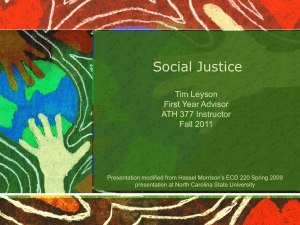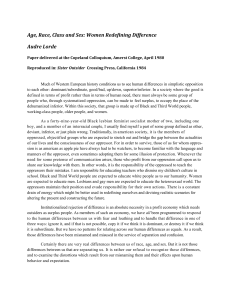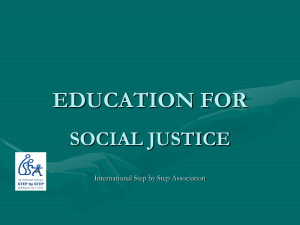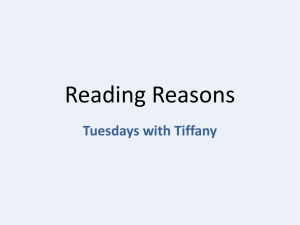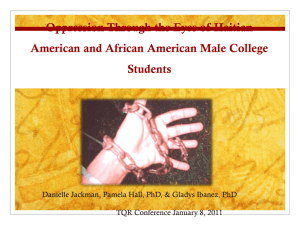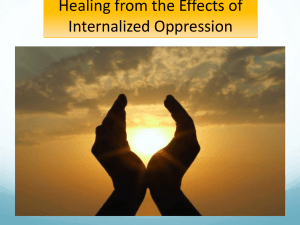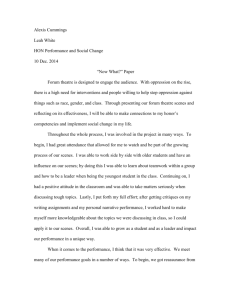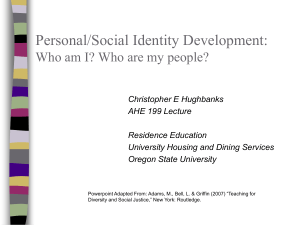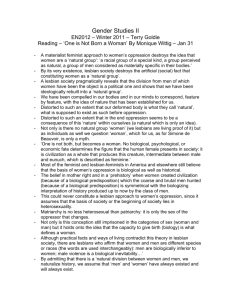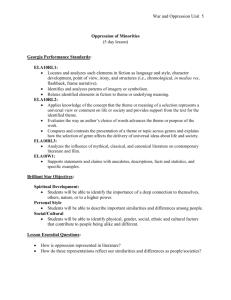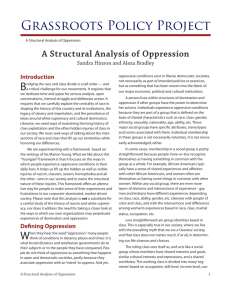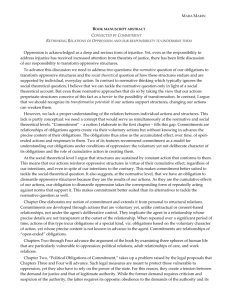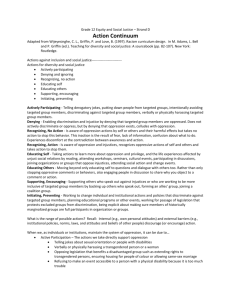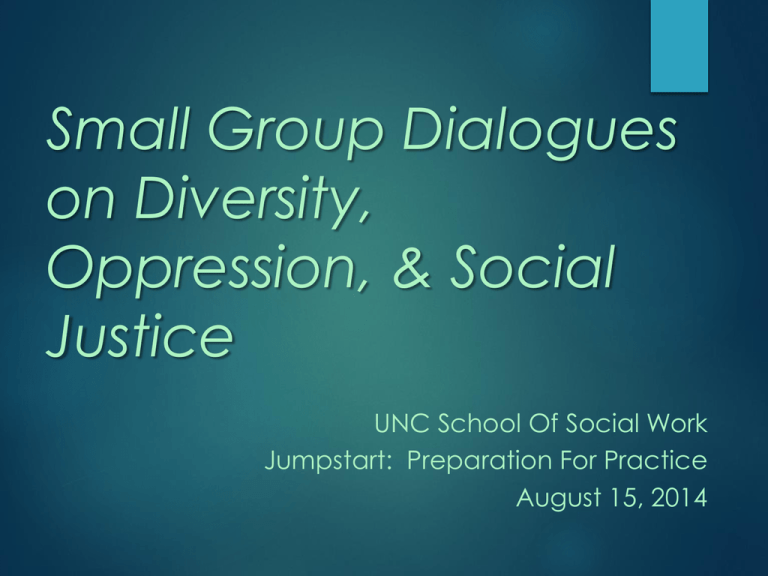
Small Group Dialogues
on Diversity,
Oppression, & Social
Justice
UNC School Of Social Work
Jumpstart: Preparation For Practice
August 15, 2014
Welcome!!
From Jump Start Program:
•“In this activity, we will reflect on the legacies of oppression
& social change that profoundly influence the practice of
social work … We will begin to know one another as
advocates; discuss the History of Oppression & Resistance;
share experiences; & understand how awareness &
confrontation of social injustice are woven into the
curriculum. Our hope is that you will leave appreciating the
gravity of the issues, coupled with excitement & hopefulness
about your potential as agents of positive change.”
Purpose of the Dialogues:
• To lay a foundation for active reflection on oppression &
social injustice throughout your social work education.
Why is this Important?
Conscious, critical
reflection on social justice
is central to social work
practice & relevant to all
work with marginalized
groups
•
•
Oppression often relies on
unconscious, uncritical
acceptance of assumptions
AND, human service systems have
the potential to perpetuate &
reinforce oppression
From the Code of Ethics
Social workers pursue social change…with & on
behalf of vulnerable & oppressed groups
Social workers act to expand choice &
opportunity…with special regard for vulnerable,
disadvantaged, oppressed, & exploited people
Social workers promote policies & practices that
demonstrate respect for difference …safeguard
rights…& confirm equity & social justice
Social workers act against … domination, exploitation, &
discrimination based on race, ethnicity, national origin,
color, sex, sexual orientation, gender expression, age,
marital status, politics, religion, immigration, disability
Advocate’s Autobiography
A chance to share experiences that
shaped you as an advocate
Share an example (a critical incident,
perhaps) from your own life
•
What was important or significant about this experience?
•
How did it support or challenge your assumptions & world
views?
•
What did you learn about the joyful &/or painful dimensions of
advocacy?
What lessons have you carried forward?
Five Faces of Oppression
• The fruits of labor of
one group are used
to benefit another,
to maintain power,
status, & wealth
• Exclusion from the
economy resulting in
material deprivation &
dependency, loss of
privacy, choice, inclusion
• Lack of authority or
means to exercise
rights. Persons are
devalued, cannot
develop capacities
Exploitation
Marginalization
Powerlessness
• Establishment of a dominant
group’s experience, culture, &
understanding as the norm;
others rendered invisible &/or
deviant.
Cultural
Imperialism
• Directed at members of
vulnerable or marginalized
groups; violence is systemic,
tolerated, & based on fear &
bigotry.
Violence
Exploitation
Chinese immigrants
•
Chinese Exclusion Act of 1882
African Americans
•
Persistent exploitation of
sharecroppers
•
Tuskegee experiments
American Indians
•
Taking & mismanagement of Native
land
Marginalization
Exclusion of women &
people of color from labor
protections
Educational segregation of
African American students
Exclusion of Jewish persons
from labor force &
engagement in social &
economic institutions
Powerlessness
Reproductive & sexual
exploitation/colonization, &
political
disenfranchisement of
women
Institutionalization &
oppression of persons with
disabilities
Cultural Imperialism
Oppression based on
culturally constructed &
sanctioned hierarchies of
race, gender, sexual
orientation, disability, &
birthplace
•
Black Codes
•
Women’s Suffrage
•
Redlining & the GI Bill
•
Discrimination against Mexican
Americans
Violence
Violent acts perpetrated on
African Americans, Mexican
Americans, women, LGBTQ
persons, Native peoples
•
Lynching
•
Police raids & riots
•
Outright slaughter
•
Exposure to disease
•
Sterilization
Discussing the material in the
form of “dialogue”
Dialogue: A Unique Process
Debate
• Focus: Binaries
• Goals: Persuade
others & point out
flaws
• Success:
Persuasiveness of
argument,
winning
Discussion
• Focus: A range
of perspectives
• Goals: Analysis &
understanding
• Success:
Decisions,
conclusions,
action steps
Dialogue
• Focus: Personal experience
• Goals: Awareness,
empathy, appreciation of
complexity, identification of
shared & disparate
experiences
• Success: Depth of
understanding, continued
dialogue, collaboration
Dialogue Guidelines
Assume positive intent
•
Articulating our thoughts can be tricky – let’s give each
other space to say things imperfectly, &/or try again
Ask clarifying questions focused on
understanding rather than debating
•
“Help me to understand …”
•
“I’m curious about …”
•
“My experience with that has been a little different”
Commit to confidentiality, realizing its limits
Monitor your level of participation
Online Course Discussion
Beginning the
discussion
• What is striking to you from the material that
you reviewed? What feelings are evoked?
• What could you relate to on a personal or
professional level? What was surprising to you?
Deepening the
discussion
• Where do you see the legacy of these
historical events playing out in our society &
culture presently?
• How might dynamics of oppression impact the
lives of your clients &/or your work with them?
Synthesizing
• What patterns do you see/hear?
• Why does understanding this history matter?
Develops a way of
seeing & thinking
about the people
whom we serve
Explores social
injustice in
historical, personal,
institutional, &
cultural
manifestations
Fosters the ability
to function as an
ALLY
Social
Work
Education
What is an Ally?
“… a member of a
dominant group [who]
works to dismantle any
form of oppression from
which she or he receives
benefit [&] who engages
in intentional, overt,
consistent activity that
makes privilege visible &
facilitates empowerment
of persons targeted by
oppression”
Ayvazian, 2004
Becoming an Ally
Awareness of …
• One’s privilege & role in
oppression
• The experience of oppression for
marginalized groups
Accountability…
Analysis of…
• To oneself, one’s ethical code,
one’s clients, one’s community
• Commitment to ongoing
education & self reflection
• Interactions & systems that
promote or condone oppression
Action…
• Speaking out against oppressive
statements, actions, systems
• Joining with other allies & members of
oppressed groups in social action
Inspiration!
Quotes shared by School of Social
Work Faculty
Which ones resonate particularly for
you?

